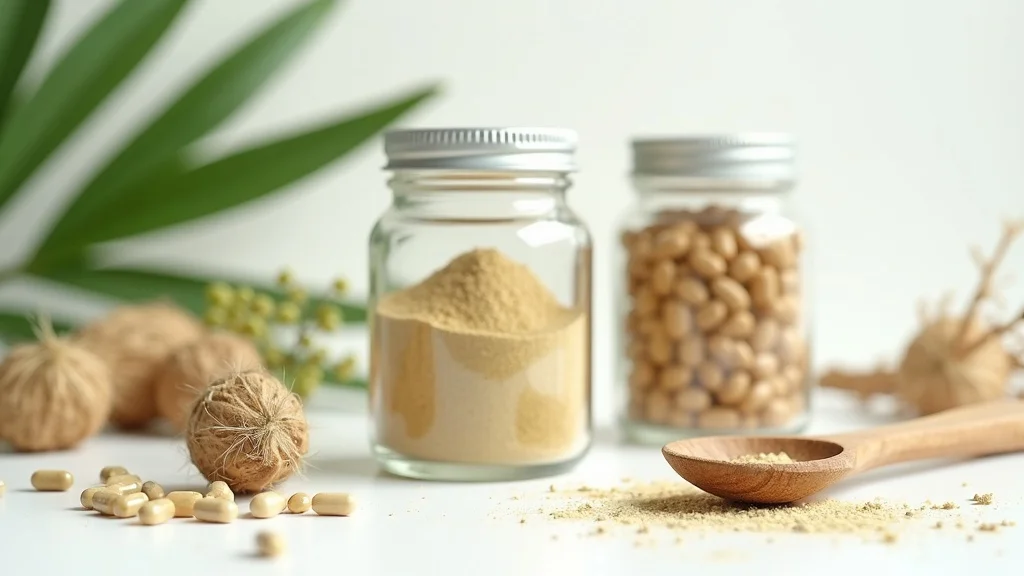Did you know? Testosterone isn’t just a men’s hormone – it directly influences energy, mood, and resilience in every human, regardless of gender. With over 40% of adults experiencing symptoms related to low or imbalanced testosterone levels at some point, understanding how to support this hormone naturally can transform your health, strength, and confidence. This guide unlocks everything you need to know about natural testosterone: why it matters, how it works in both men and women, symptoms of deficiency, and the best proven strategies to boost testosterone levels safely and effectively. Whether you want more energy, sharper focus, or improved physical performance, you’re in the right place.
A Surprising Truth: Natural Testosterone and Its Role Beyond Gender
Most people associate testosterone with masculinity, workouts, and male sex drive. But here’s the surprise: natural testosterone is essential for everyone. It shapes our vitality, bones, mood, and even sharpens thinking – in women just as much as men. Testosterone is a key sex hormone for building muscle mass, fueling ambition, and keeping bones strong. While men have higher absolute testosterone levels, women also depend on healthy levels for emotional balance, libido, and metabolic health. Ignoring this hormone’s wider role risks missing out on more energy and resilience at any age, regardless of gender.
"Testosterone is not just for men. It’s a cornerstone hormone for vitality in every human being, regardless of gender." – Dr. Alex Moore, Endocrinologist
What You’ll Learn About Natural Testosterone
- Understanding natural testosterone and its impact on health
- The importance of balanced testosterone levels for men and women
- Safe, effective ways to increase testosterone naturally
- Common symptoms and risks of low testosterone
- The science behind natural testosterone boosters and lifestyle changes
Table: Comparing Testosterone Levels — Men vs. Women
| Gender | Average Testosterone Levels (ng/dL) | Symptoms of Low Testosterone | Key Health Benefits |
|---|---|---|---|
| Male | 300–1000 | Fatigue, low libido, muscle loss | Energy, mood, muscle mass |
| Female | 15–70 | Mood swings, bone loss, low sex drive | Bone strength, libido, focus |

Understanding Natural Testosterone: The Basics
What Is Natural Testosterone?
Natural testosterone is a crucial androgen hormone produced mainly in the testicles for men and in the ovaries and adrenal glands for women. Known as a “master” sex hormone, testosterone’s influence goes well beyond physical appearance or sex drive – it regulates energy, bone density, muscle mass, fat distribution, and even memory. In men, the pituitary gland controls testosterone production by signaling the testes; in women, the process is subtler but equally vital. Without healthy testosterone production, both genders can suffer from fatigue, mood changes, and bone weakness. Unlike synthetic testosterone or testosterone replacement therapy, boosting your own natural testosterone supports your body’s optimal function without unwanted side effects.
Testosterone Levels Across Lifespan: What Changes?
From puberty to midlife and beyond, testosterone levels naturally fluctuate. Levels surge in adolescence, powering muscle growth and changes in sex drive. In both men and women, hormone levels peak around age 18–25, then start a gradual decline. This process is natural, but lifestyle, chronic stress, poor diet, and even environmental toxins can trigger lower testosterone levels much sooner or more dramatically. For some, testosterone deficiency becomes a medical condition called hypogonadism, sometimes tied to pituitary gland dysfunction. But even a mild drop below optimal range can sap energy, weaken bones, and reduce resilience. Knowing how your testosterone changes with age empowers you to respond with targeted, natural strategies.

Why Testosterone Matters for Both Men and Women
While testosterone is best known for its role in male development, women rely on this hormone for more than just sex drive. In women, testosterone maintains healthy bones, sharpens focus, maintains muscle tone, and influences emotional stability. After menopause, a natural decline in testosterone production can heighten the risk of osteoporosis and mood swings. For men, steadily falling testosterone levels can lead to decreased stamina, slower muscle recovery, and lower motivation. Both men and women with low testosterone level may experience increased fat gain, poor sleep, and weakened immunity. Recognizing symptoms early and supporting natural testosterone keeps your edge, inside and out.
Testosterone Levels: What’s Normal and What’s Not
How Testosterone Levels Fluctuate — Age, Stress, and Lifestyle Factors
Strong and stable testosterone levels don’t just happen – they’re shaped by genetics, age, diet, stress, sleep, and activity. Chronic stress floods your system with cortisol, actively suppressing testosterone production by signaling the pituitary gland to ease off. A high-sugar, low-nutrient diet impairs hormonal signaling, while steady regular exercise (especially resistance training) boosts testosterone naturally. Sleep deprivation, exposure to certain environmental toxins, and heavy alcohol use can all sharply lower testosterone levels. Learning your individual hormone patterns (via bloodwork) helps distinguish between a normal, age-related dip and a true testosterone deficiency needing action.

Symptoms of Low Testosterone in Men and Women
Some symptoms of low testosterone are easy to miss, and others may be mistaken for common lifestyle fatigue, stress, or other health conditions. Early signs may appear subtly, especially in women, but recognizing them leads to earlier intervention and improved outcomes.
- Fatigue
- Muscle weakness
- Mood disturbances
- Low sex drive
- Poor concentration
If you experience these symptoms for weeks at a time, especially alongside increased body fat or difficulty building muscle mass, it’s time to check your testosterone levels. Men with low testosterone can additionally develop erectile dysfunction or reduced beard growth, while women may notice thinning hair and bone loss.
Health Conditions Linked to Low Testosterone
Erectile Dysfunction and Natural Testosterone
In men, one of the most common and distressing effects of low testosterone levels is erectile dysfunction (ED). Testosterone is a hormone crucial for sexual arousal, sustaining erections, sperm production, and overall confidence. While ED can also stem from circulatory challenges or psychological causes, men with low testosterone often find libido drops and performance lags. Addressing testosterone deficiency—through diet, exercise, or safe supplementation—can improve ED and revitalize sex drive, but it’s always wise to check for other underlying medical conditions first. For women, low testosterone may also dampen sexual interest, pleasure, and arousal, demonstrating its significance for sexual health in both sexes.

Prostate Cancer Risk: Truth & Myths about Testosterone
A common fear is that higher testosterone levels increase the risk of prostate cancer. Recent research, however, finds no clear link between natural testosterone and increased cancer risk in healthy men. In fact, men with low testosterone may face a higher risk of aggressive prostate cancer, as healthy hormone levels help regulate cell growth. While testosterone replacement therapy should only be used under medical supervision, increasing your own natural levels through lifestyle changes or diet generally doesn’t elevate cancer concerns. Always discuss your individual risk profile with a doctor, especially if there’s a history of health conditions like prostate or breast cancer in your family.
Bone Strength, Osteoporosis, and Low Testosterone Levels
Healthy testosterone is essential for bone density in both men and women. In fact, one of the earliest warning signs of low testosterone in aging adults is an increased risk of osteoporosis—brittle, fragile bones that break easily. Women experience this risk especially after menopause, when hormone balance shifts rapidly. For men, gradual testosterone loss in middle age can also silently weaken bones, raising the risk of falls and fractures. Supporting testosterone production naturally through strength training, a mineral-rich diet, and regular sunlight exposure for vitamin D becomes vital for maintaining lasting skeletal health.

How Can I Increase My Testosterone Naturally?
- Key nutrition for healthy testosterone production
- Exercise routines: Resistance training vs. cardio
- Sleep hygiene and hormone balance
- Avoiding environmental toxins
- Natural testosterone supplements
Natural Testosterone & Diet: What to Eat and What to Avoid
A nutrient-rich diet is foundational for testosterone production. Foods high in zinc (like shellfish, pumpkin seeds), healthy fats (olive oil, avocados), lean protein, and magnesium (leafy greens, nuts) all support healthy hormone levels. Minimize refined sugar, trans fats, and excess alcohol, as these can lead to lower testosterone levels and disrupt the pituitary gland’s regulation. Diets rich in colorful produce and antioxidants can reduce oxidative stress, helping your cells maintain healthy testosterone. For many, simple changes—like having eggs, nuts, and greens daily—make a measurable difference in energy, mood, and muscle mass.

Best Lifestyle Habits to Boost Testosterone
Beyond diet, regular resistance training (like weight lifting or bodyweight exercises) is proven to boost testosterone production for both sexes. Focus on compound movements that work many muscles at once. Adequate, high-quality sleep (7–9 hours) allows your body’s hormones to reset and heal. Minimize chronic stress by practicing daily relaxation, limiting screen time at night, and getting outdoors. Reducing exposure to hormone-disrupting chemicals—found in some plastics, pesticides, and personal care products—also helps maintain healthy testosterone levels. Small daily changes, repeated over weeks, bring big improvements in energy and emotional well-being.
What Is the Best Form of Natural Testosterone?
Food vs. Supplements: The Pros and Cons
Getting your natural testosterone from food is the safest, most sustainable approach. Whole foods provide the full spectrum of cofactors that aid hormone production and overall health. Supplements can help if you have a deficiency or struggle to get nutrients from your diet, but quality, purity, and dosage must be considered to avoid toxicity or side effects. Natural testosterone boosters—herbal extracts, vitamins, and minerals—should always be paired with lifestyle improvements for the biggest impact. Consult a healthcare provider if you’re considering supplements, and remember: there is no quick fix.
Top Natural Testosterone Boosters Ranked
Herbs Backed by Science
- Ashwagandha
- Fenugreek
- Tribulus terrestris
- Shilajit
"Many herbs can support testosterone production but the right dosage, purity, and preparation are key for effectiveness." – Dr. Sarah Blake, Naturopath
Each of these herbs has scientific evidence supporting their role in enhancing testosterone levels or reducing symptoms of low testosterone. However, herbs work best when combined with a hormone-friendly lifestyle and proper nutrition. High quality, third-party tested supplements are a must.
How to Boost Testosterone by 200%: Is It Really Possible?
Realistic Expectations: How Much Can You Boost Your Testosterone Naturally?
Sensational claims of “boosting testosterone by 200%” are everywhere, but what does research actually show? For people with low testosterone due to lifestyle, stress, or diet, significant improvements are possible—sometimes even doubling levels by optimizing sleep, exercise, and micronutrient intake. Yet, if your testosterone levels are already in the optimal range, further increases are modest and naturally self-regulated by your body. The best gains occur when addressing real deficiencies and removing chronic obstacles, not chasing dangerous highs. Remember, health is about balance, not extremes.

Case Studies and Success Stories
Many have reclaimed their vitality and energy by embracing natural testosterone strategies. Take “James,” a 45-year-old with chronic fatigue and flagging motivation. After three months of combining resistance training, high-zinc meals, and herbal supplements like Ashwagandha, his testosterone levels rose from the lower end of normal to mid-optimal range—and his muscle mass, mood, and sex drive all improved. “Maya,” a 60-year-old woman, saw bone density and energy bounce back by addressing low vitamin D and adding short burst exercise. The most inspiring stories combine medical guidance with consistent daily habits.
Most Powerful Herb for Natural Testosterone: What the Evidence Says
Scientific Findings on Tongkat Ali, Ashwagandha, and Others
Recent studies spotlight several herbs showing promise for supporting healthy testosterone levels. Tongkat Ali (Eurycoma longifolia) is renowned for boosting libido and energy, with randomized trials showing significant hormone increases in both stressed men and women with low initial levels. Ashwagandha, long used in Ayurvedic medicine, also demonstrates positive effects on stress reduction and testosterone. Fenugreek and Shilajit are likewise backed by science for enhancing testosterone production, improving energy, and even supporting endurance during regular exercise.
Dosages, Safety, and Synergy with Diet
When using herbal supplements, dosage and source quality are critical for both safety and results. Effective doses vary (e.g., Tongkat Ali: 200-400mg daily; Ashwagandha: 300-600mg daily), and should be used in short cycles. Combining herbs with a nutrient-dense diet amplifies effect—think leafy greens, eggs, seeds, and oily fish. Pay attention to potential interactions with medications and rare side effects like insomnia or mild digestive symptoms. Always consult your doctor if you’re managing health conditions or taking prescription medication.

Potential Side Effects & Safety of Natural Testosterone Approaches
- Interactions with medications
- Hormone balance versus overload
- Warning signs to watch out for
Natural does not always mean risk-free. Over-supplementation can lead to hormonal imbalances, aggression, sleep disruption, or even liver strain. If you notice severe acne, mood swings, or persistent insomnia, halt new supplements and consult a medical professional. Those with hormone-sensitive health conditions, such as prostate cancer or polycystic ovarian syndrome, should avoid herbal boosters unless guided by a physician. When in doubt, less is more and regular testing of testosterone level is your best safeguard.
FAQs About Natural Testosterone
-
Are natural testosterone supplements safe for everyday use?
Most people tolerate natural supplements well when taken as directed. However, long-term daily use without breaks is not recommended unless supervised by a healthcare provider. Monitor for side effects and be aware of possible interactions. -
How fast can I see results?
Some improvements (like energy or sleep) may appear within 2–3 weeks, while measurable increases in muscle mass or bone density can take several months. Consistency is key, and effects are enhanced when combined with diet and exercise. -
Can women take natural testosterone boosters?
Yes, but doses are usually lower and not all supplements are appropriate for everyone. Women should prioritize food, movement, and stress reduction first, considering herbal supplements only after discussing with a healthcare provider. -
Which health conditions are linked to low testosterone?
Low testosterone increases risk for osteoporosis, fatigue, depression, erectile dysfunction, metabolic syndrome, and reduced sex drive in both men and women. -
Do plant-based extracts work as well as pharmaceuticals?
They can support normal testosterone levels when mild to moderate declines are due to lifestyle, but severe testosterone deficiency may require medical management.
Key Takeaways: Harnessing the Benefits of Natural Testosterone
- Testosterone is crucial for energy, mood, bone health, and libido in both sexes
- Low testosterone can affect emotional and physical resilience
- Diet, exercise, sleep, and natural supplements all play a key role
- Seek individualized advice for the safest, most effective results
Conclusion: Reclaim Your Strength With Natural Testosterone
Next Steps for Rebalancing Hormones Naturally
Now that you know how essential natural testosterone is, it’s time to take action. Focus on food and lifestyle first—then add targeted supplements for that extra edge.
How to Start Your Natural Testosterone Journey Today
Begin by getting your hormone levels checked, set actionable goals (better sleep, more protein, resistance training), and introduce changes gradually. Track your progress and adjust as needed.
"Your body has everything it needs to thrive — you just need to listen and give it the right tools."
 Add Row
Add Row  Add
Add 




Write A Comment